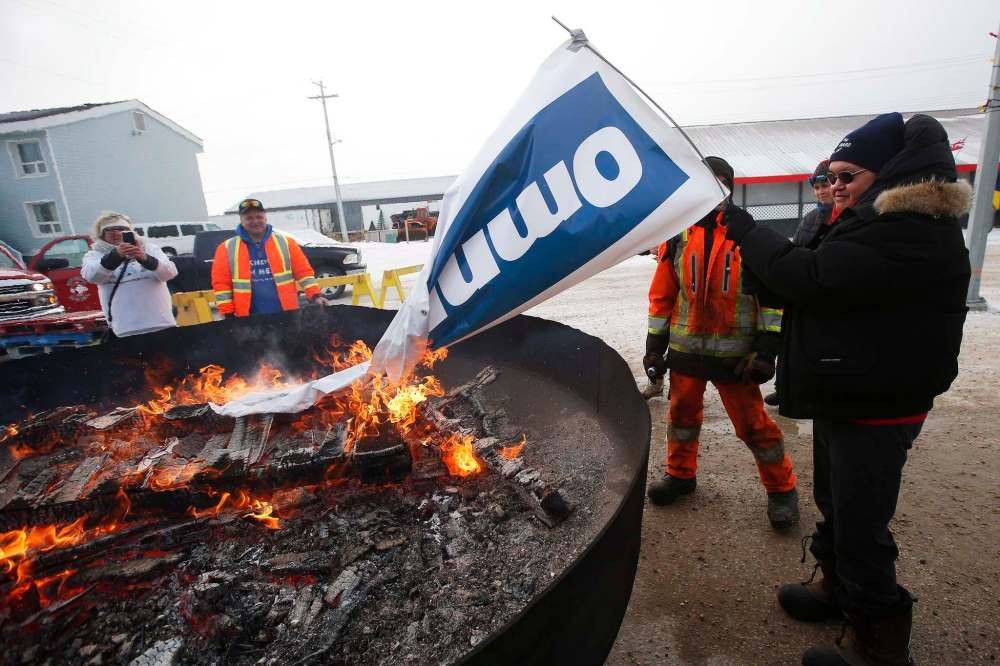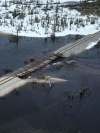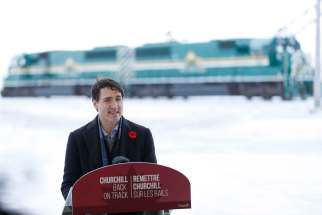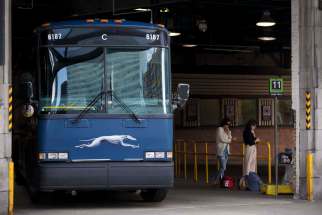Back on track: train rolls into relieved Churchill; Trudeau joins party
Read this article for free:
or
Already have an account? Log in here »
To continue reading, please subscribe:
Monthly Digital Subscription
$0 for the first 4 weeks*
- Enjoy unlimited reading on winnipegfreepress.com
- Read the E-Edition, our digital replica newspaper
- Access News Break, our award-winning app
- Play interactive puzzles
*No charge for 4 weeks then price increases to the regular rate of $19.00 plus GST every four weeks. Offer available to new and qualified returning subscribers only. Cancel any time.
Monthly Digital Subscription
$4.75/week*
- Enjoy unlimited reading on winnipegfreepress.com
- Read the E-Edition, our digital replica newspaper
- Access News Break, our award-winning app
- Play interactive puzzles
*Billed as $19 plus GST every four weeks. Cancel any time.
To continue reading, please subscribe:
Add Free Press access to your Brandon Sun subscription for only an additional
$1 for the first 4 weeks*
*Your next subscription payment will increase by $1.00 and you will be charged $16.99 plus GST for four weeks. After four weeks, your payment will increase to $23.99 plus GST every four weeks.
Read unlimited articles for free today:
or
Already have an account? Log in here »
Hey there, time traveller!
This article was published 01/11/2018 (2598 days ago), so information in it may no longer be current.
CHURCHILL — Residents breathed a collective yet bittersweet sigh of relief as a visiting first minister delivered news they’d been waiting too long to hear Thursday.
After about 17 months out of service, the Hudson Bay Railway is back on track and will be carting passengers and freight to Manitoba’s northern hub by the end of November, Prime Minister Justin Trudeau announced.
He also pledged more than $3.8 million for 40 projects geared at helping revitalize Churchill through tourism and other initiatives.

“You all know too well the kind of far-reaching consequences this has had on your community,” Trudeau said. “Prices surged, projects had to be put on hold, plans had to be delayed. Families, students, workers and shop owners were left stranded… I know times have been incredibly tough, but the resilience and determination you have shown has been inspiring.
“You organized town halls, you made your voices heard and when things weren’t moving fast enough, you put pressure on everyone involved,” he added. “You did everything you needed to do to make sure we got this done and that we got this done right.”
In May 2017, flooding washed out 29 parts of the railway. Former owner Omnitrax refused to make repairs, leaving the community in the lurch for months without an overland link; goods needed to be shipped in by air or sea.
On Aug. 31, a new ownership team, Arctic Gateway Group, took over operations, making the required fixes within 35 days.
A test run Wednesday evening saw the first locomotives arrive in town, sending Halloween trick-or-treaters dashing toward the now-unfamiliar sound of a train rolling into the station.
“As soon as that train honked, that was it — no more kids,” said port worker Melvin Spence, who was supposed to be handing out candy, but didn’t mind keeping some for himself.
“I think that was a nice present for all the kids, having the train come.”
Khalee Palmer, 16, had been stressed during her entire senior high school year, waiting for the trains to arrive.
“My biggest thing right now is I think a lot of people in town are mad at Justin,” she said. “My Grade 12 year would have been so different had they just put the money into fixing (the tracks), you know? They had the resources, they had the power — they just didn’t.
“And I think a lot of us are feeling upset because (Trudeau) definitely was helping us, but he was helping us behind closed doors. So unless you knew he was doing it, all we saw was that we were struggling.”
Word of the teenager’s critiques at a town hall meeting earlier this year made its way back to Trudeau, who quoted from her in his remarks to the community Thursday.
The prime minister addressed hundreds at a street party he crashed on Kelsey Boulevard organized to celebrate the handiwork of the rail crew, residents said.
“I don’t consider it a Trudeau celebration. I mean, yeah he gave us money, but it shouldn’t have took that long,” said Patricia Kandiurin, who threw an Omnitrax banner she’d hung on to for three years into a community bonfire.
Churchill-Keewatinook Aski MP Niki Ashton agreed that it was a relief to have rail service restored, but said Ottawa ought to have acted sooner.
“It didn’t have to be this way. Clearly the repairs could have been done faster than they were,” the New Democrat said from Ottawa.

The Liberals did not invite her to accompany the prime minister to her riding, and there were no representatives from the provincial government, either. Assembly of Manitoba Chiefs Grand Chief Arlen Dumas was present, however.
“Churchill is a gem; it’s invaluable to our country,” Ashton said. “Really, it’s a community that requires the government to partner with it, to truly reach the potential that it deserves.”
She also added that taxpayers deserve more answers on whether Omnitrax was paid or allowed to abandon its legal liabilities in the federal deal that transferred the railway and port into local hands.
Mayor Mike Spence emphasized how encouragement from across Canada helped Churchill citizens feel they weren’t forgotten. “Know I’m Here” became the town’s unofficial motto, freshly painted on a mural across the old navy base and printed on T-shirts and signs.
“People across Canada sent strong messages of support telling us clearly that they knew we were here, a very powerful message to us,” Spence said.
“We knew that once we got through this, we would be positioned for a greater and greater future, not just for us, but for Canada’s North.”
At the street party, staff from the local school considered when they might know whether Churchill has truly bounced back after this year-and-a-half-long stalemate. It will be at least a few years before the town can properly analyze the results of the rail’s absence and return, said educational assistant Ted Fenner.
“It was weird how emotional (the train arrival) was,” he said. “You don’t realize how important something is until it’s gone.”
jessica.botelho@freepress.mb.ca
Twitter: @_jessbu
– With files from Dylan Robertson
No carbon cash commitment
In Churchill Thursday, Prime Minister Justin Trudeau would not say whether the province’s $67-million portion of the Low Carbon Economy Fund is in jeopardy after Premier Brian Pallister opted out of his made-in-Manitoba carbon-tax plan last month.
Trudeau dodged that question and another about whether his government is implementing a “two-tier carbon-tax” system, as Pallister has alleged, currying favour with eastern provinces such as New Brunswick and Quebec with lower taxes and special project exemptions.
The prime minister said the federal government would prefer to work with the provinces and territories to fight climate change, but would require everyone putting a price on pollution, which not every province — namely Manitoba, Saskatchewan and Ontario — wants to do.
”Almost all provinces and territories came together in 2016 with an agreement to fight climate change. Now unfortunately, a small number of provinces have decided that they don’t want to fight climate change. Well, Canadians expect this government to act and that’s exactly what we’re doing,” Trudeau said.
Pallister has been adamant his government wants to battle climate change, but doesn’t believe having a carbon tax is necessary in order to do so. The province says it was promised $67-million for green projects from Ottawa, but that funding is under review.
“We are now in discussions in seeing how we can work with Manitobans to make sure that we continue to invest in a greener future, even if the province has decided it doesn’t want to be a part of that,” Trudeau said.
— Jessica Botelho-Urbanski
History
Updated on Thursday, November 1, 2018 11:12 PM CDT: Adds with files from credit










